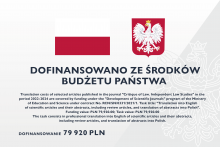The purpose of the article is to propose a concept of the collective right to food which may turn out to be essential in fighting hunger and malnutrition on a global scale. International agreements, including Pacts on Human Rights, overlook the rights of indigenous peoples by corresponding to the individualistic, state-centric, consumeristic and commercial vision of the right to food. An approach, which is based on the objectives of critical studies on law, to the official dogma of the right to food (developed within expert and intergovernmental bodies in the form of the UN Committee on Economic, Social and Cultural Rights) allows for claiming that the dogma is less legitimized than the collective right to food (defined in the Decla-ration of Atitlán) resulting from the indigenous peoples’ practice. This is why, remaining in the sphere of the official, Grotian international legal order, it should be acknowledged that the indigenous peoples’ right to food defined in the article is a part of third-generation rights (next to the second-generation individualistic right to food) while remaining strictly connected to the right to self-determination and the right to development. It is a result of the long-term practice of those peoples. The above-mentioned proposal of the third-generation right to food has not been applied to the legal doctrine so far. Its value is the opportunity to develop and study the concept of food sovereignty that allows one to more effectively combat hunger and malnutrition on a global scale as compared to the previous actions of international communities.






